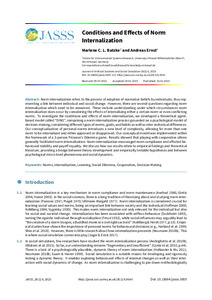| dc.date.accessioned | 2023-02-24T08:26:24Z | |
| dc.date.available | 2023-02-24T08:26:24Z | |
| dc.date.issued | 2023-01-31 | |
| dc.identifier | doi:10.17170/kobra-202302247539 | |
| dc.identifier.uri | http://hdl.handle.net/123456789/14438 | |
| dc.description.sponsorship | Gefördert durch den Publikationsfonds der Universität Kassel | |
| dc.language.iso | eng | |
| dc.subject | Norms | eng |
| dc.subject | Internalization | eng |
| dc.subject | Learning | eng |
| dc.subject | Social Dilemma | eng |
| dc.subject | Cooperation | eng |
| dc.subject | Decision-Making | eng |
| dc.subject.ddc | 150 | |
| dc.subject.ddc | 300 | |
| dc.title | Conditions and Effects of Norm Internalization | eng |
| dc.type | Aufsatz | |
| dcterms.abstract | Norm internalization refers to the process of adoption of normative beliefs by individuals, thus representing a link between individual and social change. However, there are several questions regarding norm internalization which need to be answered. These include understanding under which circumstances norm internalization does occur by considering the effects of internalizing either a certain norm or even conflicting norms. To investigate the conditions and effects of norm internalization, we developed a theoretical agent-based model called “DINO”, comprising a norm internalization process grounded on a psychological model of decision-making, considering different types of norms, goals, and habits as well as inter-individual differences. Our conceptualization of personal norms introduces a new level of complexity, allowing for more than one norm to be internalized and either approved or disapproved. Our conceptual model was implemented within the framework of a 3-person Prisoner’s Dilemma game. Results showed that playing with cooperative others generally facilitated norm internalization. Norm internalization encouraged norm compliance and affected behavioural stability and payoff equality. We discuss how our results relate to empirical findings and theoretical literature, providing a bridge between theory development and empirically testable hypotheses and between psychological micro-level phenomena and social dynamics. | eng |
| dcterms.accessRights | open access | |
| dcterms.creator | Batzke, Marlene Clara Lucia | |
| dcterms.creator | Ernst, Andreas | |
| dc.relation.doi | doi:10.18564/jasss.5003 | |
| dc.subject.swd | Lernen | ger |
| dc.subject.swd | Internalisierung <Psychologie> | ger |
| dc.subject.swd | Kulturstandard | ger |
| dc.subject.swd | Entscheidungsfindung | ger |
| dc.subject.swd | Soziales Dilemma | ger |
| dc.type.version | publishedVersion | |
| dcterms.source.identifier | eissn:1460-7425 | |
| dcterms.source.issue | Issue 1 | |
| dcterms.source.journal | JASSS : the Journal of Artificial Societies and Social Simulation | eng |
| dcterms.source.volume | Volume 26 | |
| kup.iskup | false | |
| dcterms.source.articlenumber | 5003 | |

